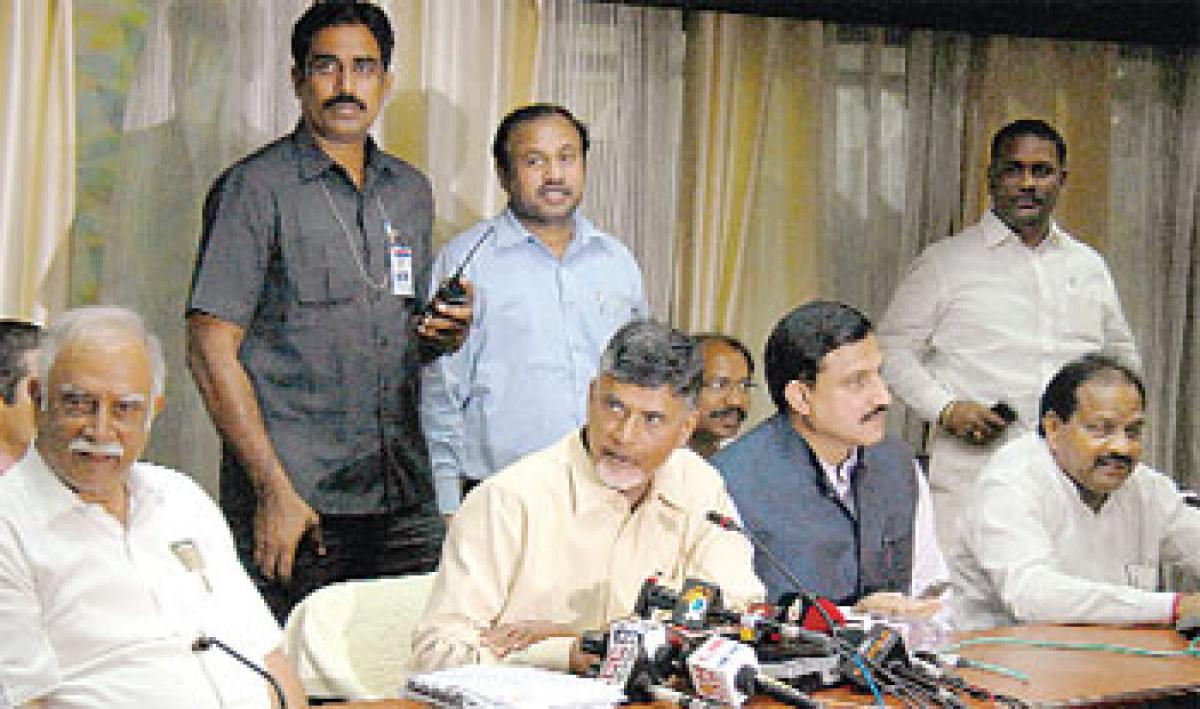Live
- ‘Get Set, Grow Summit 2024’ Focuses on Digital Detox for Families
- Stokes motivates his team to put in extra effort, says England pacer Potts
- From overcoming setbacks to leading India in U19 Women’s Asia Cup, Niki Prasad's amazing journey
- Driving Enterprise Security: Inside Venkata Reddy Thummala’s Leadership Journey
- Constitution debate: PM Modi hails 'Nari Shakti'; makes strong pitch for 'United Bharat’
- Abhijeet Bhardwaj: Revolutionizing Enterprise Analytics with Innovation and Expertise
- Bihar: Inquiry initiated against principal who went to buy veggies during school hours
- Press Sri Lankan Prez for release of Indian fishermen: TN Cong MP to EAM Jaishankar
- TN: DMK postpones executive meet due to heavy rains & Parliament session
- Porous silicon oxide electrodes can fix durability issues in batteries: Researchers
Just In

x
Highlights
Chief Minister N Chandrababu Naidu, Haryana Chief Minister Manohar Lal, and the Chief Minister of Uttarakhand, Harish Rawat, on Wednesday called on the Prime Minister, Narendra Modi, and submitted the final report of the sub-group of Chief Ministers on Swachh Bharat Abhiyaan.
- Naidu, other members submit report to PM
- Suggests funding in 75: 25 ratio between Centre, States
.jpg) New Delhi: Chief Minister N Chandrababu Naidu, Haryana Chief Minister Manohar Lal, and the Chief Minister of Uttarakhand, Harish Rawat, on Wednesday called on the Prime Minister, Narendra Modi, and submitted the final report of the sub-group of Chief Ministers on Swachh Bharat Abhiyaan.
New Delhi: Chief Minister N Chandrababu Naidu, Haryana Chief Minister Manohar Lal, and the Chief Minister of Uttarakhand, Harish Rawat, on Wednesday called on the Prime Minister, Narendra Modi, and submitted the final report of the sub-group of Chief Ministers on Swachh Bharat Abhiyaan. The Prime Minister complimented the Chief Ministers for their efforts. He said that the task of accomplishing Swachh Bharat, though difficult, was not impossible to achieve.
The Sub-Group of Chief Ministers on Swachh Bharat Abhiyaan was constituted on March 24, 2015 pursuant to the decision taken in the first Governing Council Meeting of the NITI Aayog held on February 8 this year.
The Sub-Group consisted of Chief Ministers of Andhra Pradesh, Bihar, Delhi, Haryana, Karnataka, Maharashtra, Mizoram, Sikkim, Uttarakhand and West Bengal as members with Chief Minister of Andhra Pradesh as the Convener.
The Sub-Group met four times at New Delhi, Chandigarh and Bengaluru where intense deliberations on the subject were held.The Terms of Reference of the Sub-Group included examining financial requirements for comprehensive implementation of the Swachh Bharat Mission and suggesting measures for meeting budgetary needs,
recommending robust institutional mechanisms for effective implementation, recommending measures for technological support for different components of SBM, including solid and liquid waste management in rural and urban areas,
examining models for private sector participation in the Swachh Bharat Mission and to suggesting ways for substantial improvement in participation of private sector and civil society organisations for effective implementation.
The main recommendations of the report include bringing the behavior change and encouraging positive habits related to sanitation and cleanliness among the people.
To bring about this transformation, a professionally driven behaviour change communication strategy and increasing the funding for the Information, Education and Communication (IEC) component of the Mission, has been suggested.
Including sanitation and cleanliness in school curriculum and formation of a team of students to be called as ‘Swachhta Senani’ in schools and colleges have been proposed to spread awareness about sanitation and cleanliness.
Given the scale and importance of the programme, it has been suggested that the sharing pattern of funds for this programme between the Centre and States may be in the ratio of 75:25, while for hilly States it may be kept at 90:10.
To raise resources for the programme, Swachh Bharat bonds may be issued and a Swachh Bharat cess may be levied by the Central government on petrol, diesel, telecom services and also on accumulated waste produced by plants generating mineral waste like coal, aluminum, and iron ore.
To provide guidance, support and monitoring of the programme, the report recommends setting up of a dedicated Mission for the Swachh Bharat Abhiyaan, both at National and State Level.
The report recommends certain measures to attract private sector participation and Public Private Partnership (PPP).Incentive measures have been proposed such as Swachh Bharat Grading/Rating for all Gram Panchayats, Municipalities, Blocks, Districts and States, each year to promote competition among them.
Further, it has been recommended that one day in each month and one week each year (culminating with October 2) may be assigned for the activities of the Swachh Bharat Abhiyaan and to reward best performing gram panchayat, block, urban local bodies, district and State as per the ratings.
The report proposes to enhance the assistance for construction of one unit of individual household toilet in both urban and rural areas to Rs. 15,000.
The report recommends integration of rag pickers into the waste management system so that their livelihood is not adversely affected. Further,
both Centre and States should make efforts towards eradication of manual scavenging activity through strict enforcement of the Prohibition of Employment as Manual Scavengers and Their Rehabilitation Act, 2013.

Next Story
More Stories
ADVERTISEMENT
© 2024 Hyderabad Media House Limited/The Hans India. All rights reserved. Powered by hocalwire.com







